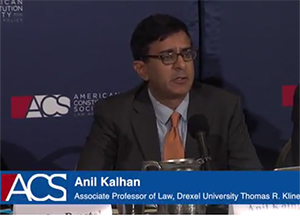Professor Anil Kalhan took part in a panel discussion of issues before the Supreme Court in 2017-18 at the National Press Club on Sept. 14.
Kalhan noted that the U.S. Supreme Court docket includes three immigration cases, including the executive order President Trump signed suspending the entry of nationals from six Muslim majority countries.
It’s far from clear that the justices will actually rule on the matter, Kalhan said, citing the court’s history in dealing with immigration issues.
“Often what he court has done is use the canon of constitutional avoidance,” Kalhan said, explaining that the court often grants political branches of government deference in resolving immigration matters.
 Asked if Trump’s statements about wanting to ban Muslims from entering the country during the presidential campaign would likely influence the court, Kalhan declined to make a prediction.
Asked if Trump’s statements about wanting to ban Muslims from entering the country during the presidential campaign would likely influence the court, Kalhan declined to make a prediction.
“We don’t have a good read on how the justices would engage that,” he said. “My own view is that motivation is relevant to the doctrinal claim, therefore you look to evidence of motivation. It’s not just statements on the campaign trail, there is some evidence of religious animus that the plaintiffs have pointed to on the face of the order itself. There have been statements ongoing during the term of the administration.”
Kalhan joined Professor Martin Lederman of Georgetown University Law Center, attorney Erin Murphy of Kirkland & Ellis, Dale Ho of the American Civil Liberties Union, Claire Prestel of Service Employees International Union and Professor Steven Schwinn of the John Marshall Law School on the panel, which was hosted by the American Constitution Society.